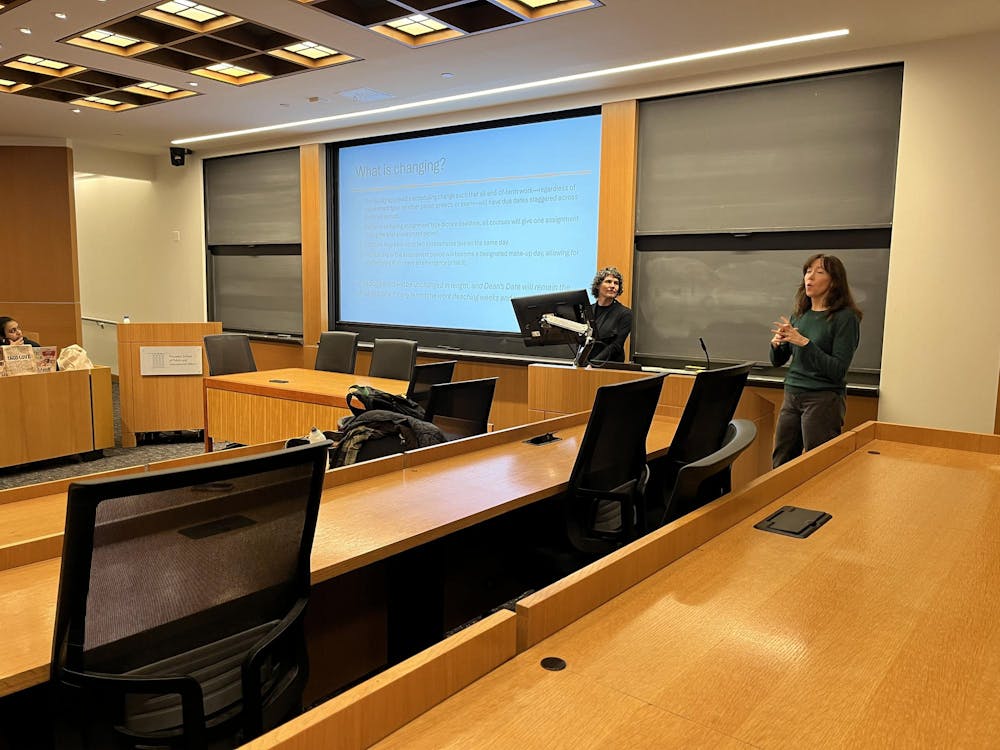Undergraduate Student Government (USG) reconvened for their first meeting since fall break, Senior Associate Dean of the College Anne Caswell and Associate Dean for Academic Advising Cecily Swanson detailed new academic policies that will be implemented in Spring 2025.
The end of the Spring semester will introduce staggered due dates of final exams, papers, and projects across the assessment period, effectively replacing Dean’s Date as students have known it in past semesters. Professors will also be limited to only one final assessment during the exam period, and one makeup day will be added to the end of this assessment period to allow for more flexibility in cases of rescheduling needs, and class finals will be announced earlier in the semester.
“We’re trying to make things better,” Caswell explained. “Essentially, what we want to do is make what you’re getting into at [the] end of term much more transparent. You can see the dates for everything, and we want you to have that information much, much earlier.”
Other changes to the finals period include increasing the number of exams or essays students can have scheduled on the same day to a maximum of two assessments, as well as a recommendation that professors limit the recommended time for take-home exams to three hours. Last spring, the University piloted allowing students to take more than one exam in the same day, which had previously been prohibited.
The deans also discussed previously-announced schedule changes that will increase the passing time between classes to 15 minutes in order to allow students sufficient time to travel between classes. Along with this change, the deans noted that the senior thesis will now count for credit for both A.B. and B.S.E. students, starting with the Class of 2026.
“You’re doing labor in Fall of your senior year, so we want that labor to be visible,” Caswell said at the meeting. “It’ll be on your transcript. It also will then affect the number of courses that you have to add … you can have more room to balance [other courses].”
Following the conversation with Caswell and Swanson, army ROTC student Vincent Jiang ’25 spoke to the USG about his experiences in the program, and the ways in which Princeton could better support ROTC students.
Jiang said that eligibility for partial aid through Princeton is often complicated for students who accept a full ROTC scholarship, even though the scholarship does not cover both the cost of tuition and room and board. Students who receive a better offer from Princeton’s financial aid are encouraged to give up their ROTC scholarship, he claimed.

“As it currently stands, a four-year national scholarship recipient can choose to apply that scholarship towards either tuition and fees or room and board, and obviously, most people put it toward tuition and fees because that’s much more expensive. But by doing that, they basically give up their opportunity to retain partial Princeton financial aid.”
Jiang also covered issues associated with ROTC students not receiving the same benefits as athletes at the university, including the priority scheduling of facilities and the sports medical center access. He said that ROTC has been unable to reserve time in Jadwin Gym for the past year, and currently have no alternatives for weight lifting facilities, and they are also unable to access the resources at Caldwell Fieldhouse.
“I think our cadets [should be] given access to the physiotherapy resources that a lot of athletes have access to,” Jiang said. “Cadets basically have to figure out their injuries through McCosh Health Center or on their own, which is costly and takes a lot of time.”
Lastly, Jiang discussed the importance of a high GPA for ROTC students entering the army’s system for job selection post-graduation. Cadets are also required to take a military science course that does not count towards their GPA. Jiang proposed that Princeton recognize this class as an official course to help ROTC students slightly boost their GPA.

“That’s not the case at almost every other institution, they allow that class to count on our transcript for purposes of GPA,” Jiang said. “Being able to include that, I think, would at least marginally benefit us.”
USG meetings are open for all students to attend and are held on Sundays from 5–6 p.m. in Robertson Hall 016.
Devon Rudolph is a News contributor for the ‘Prince.’
Please send corrections to corrections[at]dailyprincetonian.com.








